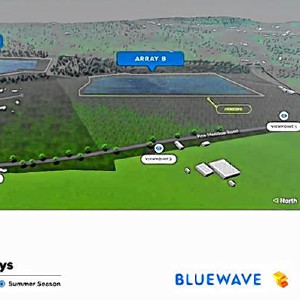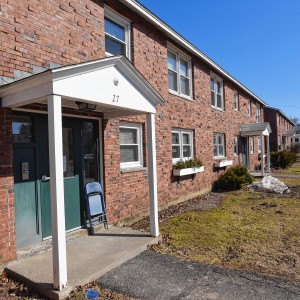My Turn: A new deal for state’s private and municipal forest landowners
| Published: 03-23-2023 4:50 PM |
The New Forestry Deal is revised legislation that will encourage Massachusetts landowners to keep their land in forest rather than developing it and help both private and municipal forest landowners better manage their forestland.
Massachusetts has 3 million acres of forestland covering 60% of the state that provides both ecological and economic benefits. However, most of our forests have been degraded and are at risk for further decline by many insects and other agents such as destructive storms.
The social cost of greenhouse gas emissions as a result of forest decline and forest loss due to development is now estimated to be over $2 billion a year.
These are the highlights of this comprehensive forestry legislation, which will:
1. Encourage more landowners to enroll in the Chapter 61 Forest Land Tax Program by providing an annual tax credit of $100 an acre per year for all enrolled acreage. Repeal the “Right of First Refusal” if a landowner withdraws from the program, which discourages enrollment; and reduce the minimum acreage from 10 acres down to 5 acres. Only about 20% of all private forestland is enrolled in this critical program, while the goal should be 50%. Eliminate all irrelevant costly programs, including “Climate Smart Forestry” and “Foresters for the Birds.”
2. Provide for an enhanced Chapter 61 to make it easy for landowners to permanently protect their forests in a conservation easement.
3. Reform the Chapter 132 Forest Cutting Law & Improving Forest Productivity.
■All forest cutting plans will be for long-term forest management. The “Short-term Harvest” (also known as destructive high-grade logging) will be eliminated.
Article continues after...
Yesterday's Most Read Articles
 Greenfield man arrested in New York on murder charge
Greenfield man arrested in New York on murder charge
 Man allegedly steals $100K worth of items from Northampton, South Deerfield businesses
Man allegedly steals $100K worth of items from Northampton, South Deerfield businesses
 Greenfield Police Logs: April 9 to April 17, 2024
Greenfield Police Logs: April 9 to April 17, 2024
 Former Leyden police chief Daniel Galvis charged with larceny
Former Leyden police chief Daniel Galvis charged with larceny
 Shea Theater mural artist chosen out of 354 applicants
Shea Theater mural artist chosen out of 354 applicants
 Millers Meadow idea would ‘completely transform’ Colrain Street lot in Greenfield
Millers Meadow idea would ‘completely transform’ Colrain Street lot in Greenfield
■All towns will adhere to a new state rule called “A Right to Practice Forestry” with an approved forest cutting plan. This will supersede all local bylaws concerning forestry and will be identical to “Right to Farm” bylaws.
■All mitigation requirements mandated by the Natural Heritage Program will be eliminated with an approved forest cutting plan. Instead, voluntary measures will be suggested with the approved forest cutting plan as it is in other states.
■Insect infestations such as the spongy moth caterpillar, the hemlock woolly adelgid, and the emerald ash borer will be monitored and control measures encouraged. These insects are causing huge numbers of tree mortality and forest decline. Enact a comprehensive program to control non-native invasive plants, which are another major threat to our forest ecosystems.
4. Reform the Massachusetts Forester Licensing Law: Forester licensing will be moved out of the state Department of Conservation and Recreation and put in the Division of Professional Licensure with all other licensed professionals. This will allow licensed foresters to have the same protections as other licensed professionals and it will also allow for greater consumer protection for landowners.
5. Encourage the development of forest industry in Massachusetts: Encourage the use of locally produced renewable firewood and regionally produced wood pellets to reduce the use of imported heating oil. Encourage the use of a wood pellet manufacturing industry in Massachusetts by providing a 30% investment tax credit of a project’s cost. Provide a job tax credit of $5,000 for every new job created in forestry and forest products industries that are located in Massachusetts.
6. Mandate no net loss of forestland from the construction of all solar farms. All new solar farms will be confined to landfills and other brownfields.
7. Cities and towns will be provided a state grant of $100 an acre per year for all municipal watersheds and all city and town conservation land that have a forest management plan. These credits and grants would provide the support to better manage these forestlands.
8. The Regional Greenhouse Gas Initiative (RGGI) is a cooperative effort by Northeast and Mid-Atlantic states to reduce CO2 emissions from large fossil fuel power plants. Massachusetts receives about $50 million a year from RGGI auctions. The proceeds from the auctions go to energy efficiency and other projects, but nothing goes for forestry. The New Forestry Deal is calling for 50% of all auction revenue go to support the New Forestry Deal. The RGGI has a “forestry protocol,” but it has done nothing to help forestry in Massachusetts.
Mark Ashton, professor of silviculture and forest ecology at the Yale School of the Environment, stated, “Developing resilient forest landscapes is more important than focusing on carbon sequestration.” He has stressed the “importance of all levels of diversity in a climate-resilient forest.”
That is common sense. Without resilient, diverse forests, CO2 sequestration rates will decline as they are now.
Support A New Forestry Deal (SD297 and HD655) and help save our forests.
Mike Leonard of North Quabbin Forestry is a consulting forester. He lives in Petersham.

 My Turn: A moral justification for civil disobedience to abortion bans
My Turn: A moral justification for civil disobedience to abortion bans My Turn: Industrial solar installations are overwhelming Northfield neighborhood
My Turn: Industrial solar installations are overwhelming Northfield neighborhood Guest columnist Rudy Perkins: Dangerous resolution on Iran
Guest columnist Rudy Perkins: Dangerous resolution on Iran Guest columnists Ellen Attaliades and Lynn Ireland: Housing crisis is fueling the human services crisis
Guest columnists Ellen Attaliades and Lynn Ireland: Housing crisis is fueling the human services crisis
